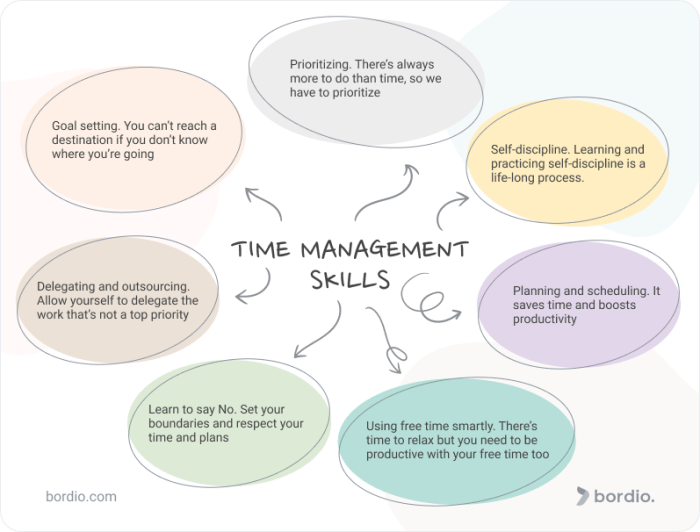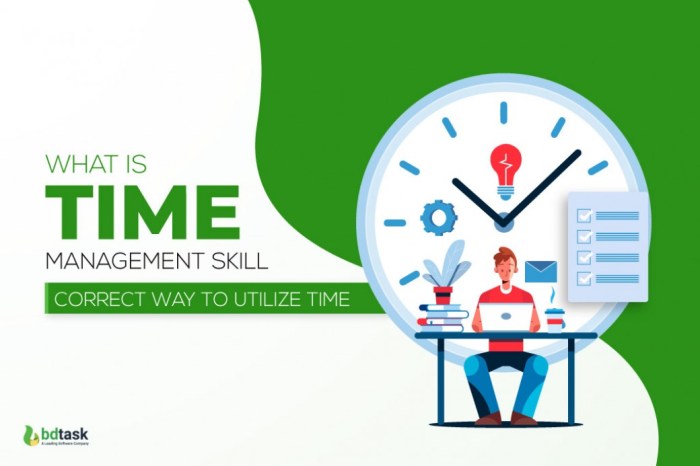Time management skills are the key to unlocking your full potential in both personal and professional spheres. Imagine a world where you can juggle tasks effortlessly, meet deadlines with ease, and still have time for yourself – that’s the power of mastering time management.
In this guide, we’ll delve into the crucial importance of time management skills, explore effective techniques to prioritize tasks, delve into the world of tools and technologies that can enhance your productivity, and discuss how these skills play out in different settings. Get ready to supercharge your efficiency and reclaim control of your time!
Importance of Time Management Skills

Time management skills are essential both in personal and professional life as they help individuals prioritize tasks, meet deadlines, and achieve goals efficiently. Without proper time management, people may struggle to balance their responsibilities, leading to stress, missed opportunities, and lower productivity.
Increased Productivity and Efficiency
Effective time management allows individuals to allocate their time wisely, focusing on important tasks and completing them in a timely manner. By avoiding procrastination and setting realistic goals, people can enhance their productivity and efficiency, accomplishing more in less time.
- Setting specific goals and deadlines helps individuals stay motivated and on track.
- Breaking down tasks into smaller steps makes them more manageable and reduces overwhelm.
- Prioritizing tasks based on importance and urgency ensures that critical work is completed first.
Consequences of Poor Time Management
On the other hand, poor time management can have detrimental effects on one’s work-life balance and overall well-being. Individuals who struggle to manage their time effectively may experience increased stress, missed deadlines, and a sense of being overwhelmed by their responsibilities.
Remember, time is a valuable resource that cannot be regained once lost.
- Procrastination can lead to rushed work, lower quality outcomes, and missed opportunities.
- Failure to prioritize tasks may result in important projects being neglected in favor of less critical activities.
- Lack of time management skills can strain relationships, as work demands encroach on personal time.
Techniques for Effective Time Management

Effective time management involves various strategies to prioritize tasks, utilize time efficiently, and achieve goals effectively. One key technique is prioritizing tasks effectively to ensure that important tasks are completed on time. Time blocking is another valuable strategy that involves allocating specific time blocks for different tasks or activities throughout the day. This helps in focusing on one task at a time and avoiding distractions, ultimately leading to increased productivity.
Prioritizing Tasks Effectively
- Make a to-do list: Start by listing all tasks that need to be completed.
- Identify urgent and important tasks: Prioritize tasks based on their urgency and importance.
- Use the Eisenhower Matrix: Categorize tasks into four quadrants based on urgency and importance – Do First, Schedule, Delegate, and Eliminate.
- Break down tasks: Divide larger tasks into smaller, manageable subtasks to make them less overwhelming.
Time Blocking
Time blocking involves scheduling specific blocks of time for different tasks or activities throughout the day.
- Create a daily schedule: Allocate dedicated time blocks for tasks, meetings, breaks, and activities.
- Focus on one task at a time: Avoid multitasking and concentrate on completing one task during each time block.
- Limit distractions: During time blocks, eliminate distractions such as phone notifications or unrelated tasks.
Setting SMART Goals
- Specific: Clearly define the goal and what needs to be accomplished.
- Measurable: Establish criteria to measure progress and success.
- Achievable: Set realistic and attainable goals within the given time frame.
- Relevant: Ensure that the goal aligns with your overall objectives and priorities.
- Time-bound: Set a deadline to create a sense of urgency and focus on timely completion.
Tools and Technologies for Time Management
In today’s fast-paced world, utilizing tools and technologies for time management can greatly enhance productivity and efficiency. By leveraging various apps and software, individuals can better track their time, prioritize tasks, and stay organized.
Popular Apps and Software
- Todoist: A popular task management app that allows users to create to-do lists, set deadlines, and track progress on tasks.
- Toggl: A time tracking tool that helps users monitor how they spend their time on different tasks and projects.
- Google Calendar: An online calendar tool that enables users to schedule events, set reminders, and share calendars with others.
Comparison of Digital Tools
- Todoist vs Toggl: While Todoist focuses on task management, Toggl is more geared towards time tracking. Users can integrate both tools to optimize their workflow.
- Toggl vs Google Calendar: Toggl offers detailed time tracking features, whereas Google Calendar provides a comprehensive scheduling platform. Combining both tools can lead to effective time management.
Benefits of Using Technology
- Efficiency: Digital tools streamline the time management process, allowing users to allocate their time effectively and reduce wasted hours.
- Accuracy: Technology provides precise tracking of time spent on tasks, enabling users to identify areas for improvement and increase productivity.
- Flexibility: Apps and software offer flexibility in managing tasks and schedules, accommodating changes and adapting to new priorities seamlessly.
Time Management in Various Settings: Time Management Skills
In different settings such as work environments, personal life, academic pursuits, and entrepreneurial ventures, time management plays a critical role in achieving success and productivity.
Time Management in Work Environment vs. Personal Life, Time management skills
In a work environment, time management is often more structured and goal-oriented, with deadlines and schedules to adhere to. Personal life time management, on the other hand, may involve balancing different priorities, such as family, social life, and self-care. It requires a more flexible approach.
Developing Effective Time Management Skills for Academic Success
- Set specific goals and prioritize tasks based on deadlines and importance.
- Use a planner or digital calendar to schedule study sessions and assignments.
- Avoid multitasking and focus on one task at a time to improve efficiency.
- Take regular breaks to maintain focus and prevent burnout.
Importance of Time Management for Entrepreneurs and Small Business Owners
- Effective time management helps entrepreneurs prioritize tasks and allocate resources efficiently.
- Meeting deadlines and managing projects on time is crucial for maintaining business credibility.
- Proper time management allows entrepreneurs to balance work responsibilities with personal life, reducing stress and improving overall well-being.